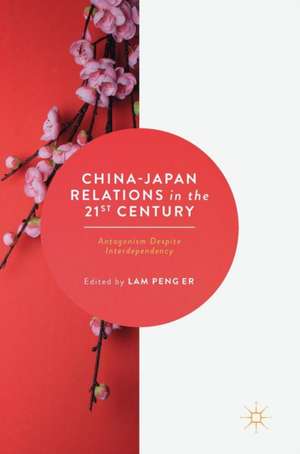China-Japan Relations in the 21st Century: Antagonism Despite Interdependency
Editat de Lam Peng Eren Limba Engleză Hardback – 21 sep 2017
| Toate formatele și edițiile | Preț | Express |
|---|---|---|
| Paperback (1) | 783.50 lei 6-8 săpt. | |
| Springer Nature Singapore – 8 dec 2018 | 783.50 lei 6-8 săpt. | |
| Hardback (1) | 788.72 lei 6-8 săpt. | |
| Springer Nature Singapore – 21 sep 2017 | 788.72 lei 6-8 săpt. |
Preț: 788.72 lei
Preț vechi: 961.85 lei
-18% Nou
Puncte Express: 1183
Preț estimativ în valută:
150.92€ • 157.57$ • 124.91£
150.92€ • 157.57$ • 124.91£
Carte tipărită la comandă
Livrare economică 04-18 aprilie
Preluare comenzi: 021 569.72.76
Specificații
ISBN-13: 9789811043727
ISBN-10: 9811043728
Pagini: 448
Ilustrații: XVII, 387 p.
Dimensiuni: 148 x 210 mm
Greutate: 0.64 kg
Ediția:1st ed. 2017
Editura: Springer Nature Singapore
Colecția Palgrave Macmillan
Locul publicării:Singapore, Singapore
ISBN-10: 9811043728
Pagini: 448
Ilustrații: XVII, 387 p.
Dimensiuni: 148 x 210 mm
Greutate: 0.64 kg
Ediția:1st ed. 2017
Editura: Springer Nature Singapore
Colecția Palgrave Macmillan
Locul publicării:Singapore, Singapore
Cuprins
Introduction ---China-Japan Paradox: Antagonism despite Interdependency.- Overview of Bilateral Relations: Local and National.- Forty-Four Years of Sino-Japanese Diplomatic Relations since Normalization.- Growing Interdependency between China and Japan: Trade, Investment, Tourism and Education.- A Clash of Nationalisms: Sino-Japanese Relations in the 21st Century.- Japan’s “Postmodern” possibility with China: A View from Kansai.- China and Japan in Multilateral Settings: Cooperation and Competition.- China and Japan in East Asian Arrangements: More Rivalry, Less Interdependence.- China, Japan and Greater Mekong Basin: A Southeast Asian Perspective.- China and Japan in the Mekong Region: Competition and Cooperation.- China, Japan and Maritime Affairs: Traditional and Non-Traditional Security.- Sino-Japanese Rivalry in Maritime Southeast Asia.- Japan and the South China Sea Dispute: Preventing “Lake Beijing”.- China and Japanese “Soft Power” Projection: A Tangled Web of Culture, Geo-Strategic Competition and Naval Power.- Triangular Relations.- The China-Japan-South Korea Trilateral Summit: Realpolitik or Liberal Peace?.- Hong Kong and the Diaoyu/ Senkaku Dispute in Sino-Japanese Relations.- Japan and China in India’s Foreign Policy.- China and Japan in Australian Foreign Policy.
Notă biografică
Dr Lam Peng Er is a Senior Research Fellow at the East Asian Institute, National University of Singapore. He obtained his PhD from Columbia University. His academic articles have appeared in journals such as the Pacific Affairs, the Japan Forum and Asian Survey. Dr Lam is an executive editor of the International Relations of the Asia-Pacific: A Journal of the Japan Association of International Relations.
Textul de pe ultima copertă
This new collection examines the paradox of Sino-Japanese relations and the rising diplomatic antagonism between both countries despite deepening economic interdependency. Offering a unique perspective on the history of bilateral ties since diplomatic normalization in 1972, it considers the growing interdependency between China and Japan in bilateral trade, investment, tourism and education, as well as the question of nationalism and Sino-Japanese rivalry in multilateral settings such as in ASEAN processes, the Mekong Basin and the South China Sea. Focusing on the power transition in East Asia, the lack of a common enemy in the post-Cold War era, the clash of Chinese and Japanese nationalism, and a lack of trust, shared values and common identity between China and Japan, this collection addresses the origins of a troubled bilateral relationship which could impact on the stability and prosperity of East Asia.
Caracteristici
Examines the history of bilateral Sino-Japanese ties at both national and local levels
Considers the triangular relations of China and Japan with third parties such as South Korea, Hong Kong, India and Australia
Focuses on bilateral cooperation and competition in multilateral settings such as the ASEAN Plus processes
Includes supplementary material: sn.pub/extras
Considers the triangular relations of China and Japan with third parties such as South Korea, Hong Kong, India and Australia
Focuses on bilateral cooperation and competition in multilateral settings such as the ASEAN Plus processes
Includes supplementary material: sn.pub/extras












